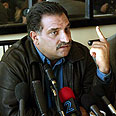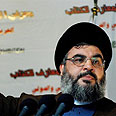

The lifting of the gag order still does not allow us to receive full information regarding the alleged suspicions against former Knesset Member Azmi Bishara. The Shin Bet and police claim that the extent of deeds and suspicions is much boarder and graver than what they revealed.
Yet they apparently prefer not to provide any details beyond what Bishara already knows, in order not to expose their sources and so that they can continue the investigation if and when Bishara returns.
Therefore, the media and public in Israel have no way of examining the evidence that law enforcement authorities used to base their suspicions against Bishara. However, there are is some circumstantial evidence that grants apparent credibility to the suspicions.
First, the fact that the High Court of Justice approved wiretaps against Bishara, and again approved them several times later. Every three months, the High Court extended the permit, apparently on the basis of the findings that were discovered through the wiretaps.
Secondly, the investigation was carried out under the close supervision of the attorney general and state prosecutor. Moreover, a State Prosecutor's Office team monitored the investigation closely and regularly.
Thirdly, the impression made by the direct quotes from conversations Bishara engaged in with foreign elements during the fighting cannot be ignored. Limited details were cleared for publication so far.
The substance of the conversations being wiretapped made it clear he was well aware he was violating the State of Israel's laws in a manner that endangered the immediate physical safety of at least some of its citizens.
Based on his familiarity with the Israeli public and its sensitivities, he advised Hizbullah on where to focus his rocket attacks in a manner that would achieve the maximal psychological and physical effect.
Moreover, he estimated the effect of bombardments in various ranges and against various targets, and advised his contacts on how to boost it.
He also advised them regarding where not to attack and what kind of propaganda messages should be directed at various population segments in Israel. That way he enabled Hizbullah to make its attacks on the Israeli home front more effective.
The quotes from the wiretaps also prove that Bishara knew he was assisting Hizbullah in improving the intelligence picture and strategic assessment formulated by the organization regarding Israel's intentions and the effect of the bombardment on the home front during the Second Lebanon War. By the way, he did not deny the quotes presented to him during interrogation.
Fourthly, the fact is Bishara himself, after realizing (in the second interrogation session) the essence of the suspicions against him, chose to remain abroad and not to face up to them, as he did in the past, in the Knesset and courts.
He also refrained from detailing in public the essence of suspicions he was well familiar with and chose to defend himself overseas, in the Arab media, claiming he was politically persecuted. This is not how an innocent person conducts himself, and particularly not a political leader who owes his voters a full report.
Missions from Hizbullah
It can be argued, and this is apparently what Bishara claimed in his interrogation, that as an Arab Knesset member he did not possess information, or access to information, that would have assisted Hizbullah significantly.
This argument is baseless on the face of it, because the Knesset Bishara was a member of was a major information center in the State of Israel, and it was enough to be there on a regular basis in order to be exposed to classified information.
Any starting journalist knows that it would be enough to walk the Knesset's corridors and sit at the cafeteria in order to randomly meet ministers, officials, and senior officers and hear them discussing sensitive subjects with Knesset members. Mingling with other Knesset members and innocent conversations would be enough to get a first-hand impression on mood and intentions.
Moreover, the Shin Bet also claims that Bishara "received missions (from his Hizbullah contacts) and carried them out." If this grave claim is true, then Bishara, in addition to his strategic and operational consulting services provided to the Hizbullah during and before the war, also spied for the organization. However, this alleged suspicion, which has still not been proven, should be qualified.
The impression emerging is that the Shin Bet and police possess clear-cut evidence, as well as witnesses, that Bishara secretly received large sums of money from foreign elements. The existing information is apparently sufficient in order to formulate an indictment over violation of money laundering legislation.
The question is who received the money ultimately. Were there payments received by Bishara that went into his own pocket or did he transfer some of them to others? And if so, to which other elements and for what purpose? At this time at least, there is serious suspicion that Bishara was the only or main beneficiary of the funds.
All of the above apparently gives rise to a disturbing picture of a person whose ego, ideology, and greed led him to commit grave crimes. Those who should be more interested than anyone in exposing the truth are Israeli Arabs, as Bishara is one of their prominent leaders.
The Arab sector, just as is the case in any democratic society, must find out it whether this is indeed about political persecution, or rather, a leader who went astray.
An overwhelming show of support for Bishara, without examining the facts, may taint the entire Arab sector. Moreover, Bishara's actions, should they be proven, may reinforce the stigma of fifth column attributed to the entire Arab sector, unjustly so, by some political elements in Israel.
For these reasons, Bishara himself has the public and moral duty to disprove the allegations against him or confess and make it clear he acted as an individual and not on behalf of the public that elected him.
















